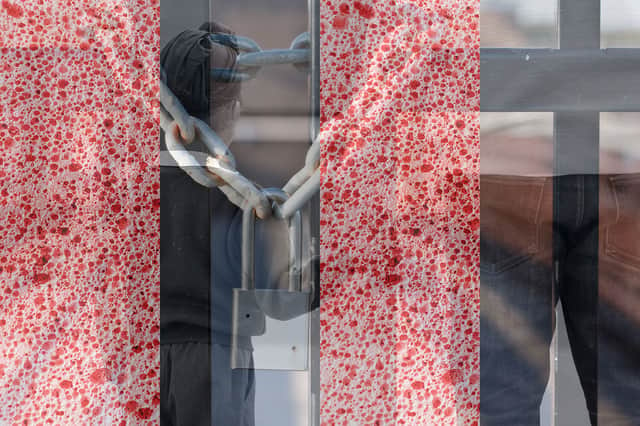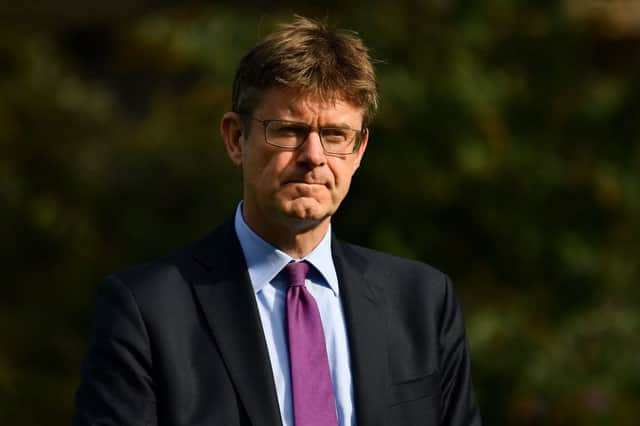Exclusive:RAAC crisis: Government accused of wrongly closing safe schools - only reopening them after council pressure
and live on Freeview channel 276
The government has come under more pressure in the crumbling concrete crisis, after appearing to erroneously close schools that were previously deemed safe.
The start of the new term has been thrown into chaos, after the Department for Education announced last week that buildings in more than 100 schools were deemed unsafe, and could not be used.
Advertisement
Hide AdAdvertisement
Hide AdMinisters have said they were acting after receiving concerning new evidence about reinforced autoclaved aerated concrete (RAAC) over the summer, which was used to construct public and private buildings between the 50s and early 90s.
St James’ Primary School in Tunbridge Wells, Kent, had RAAC issues identified earlier in the year, and part of the school was closed last term, while strengthening work took place in line with the Institute of Structural Engineers’ technical guidance.
However on Monday (4 September), the first day of term, the Department for Education told the school that it had to take out of use any areas with RAAC “until appropriate mitigations have been put in place”. A second Kent school, Palmarsh Primary in Hythe, was told on the same day it would have to close fully.


In a letter to parents, St James’ said “it is unclear whether the DfE considers the Institute of Structural Engineers’ guidance to represent ‘appropriate mitigation’” and described the late notice to close the school as “shocking”.
Advertisement
Hide AdAdvertisement
Hide AdSources told NationalWorld that the closure and actions of the DfE were “very frustrating”, with “classes of children missing school for no good reason”.
Headteacher John Tutt reassured parents that the school will “act in accordance with safety” should any more work be needed. Both Kent County Council and Tunbridge Wells MP Greg Clark have lobbied the DfE to allow St James’ to reopen.
Today (5 September), Clark announced that St James' would reopen fully on Wednesday. He said: “It was devastating to find yesterday that the works carried out over the summer needed certifying that they met the new, higher national standard brought in last week.
“I raised the situation at St James’ immediately with the Secretary of State on the floor of the House of Commons last night, and have met with the Minister throughout the last 24 hours. We are all relieved that it has been confirmed that the remedial works meet the new standard and the school will reopen.”
Advertisement
Hide AdAdvertisement
Hide AdWhile, Kent County Council confirmed that Palmarsh Primary was also able to reopen on Wednesday. A spokesperson said: “We do not and did not believe that any areas of these schools were in imminent danger, but the DfE letter prompted a safety-first approach, and we advised those schools to take RAAC-affected areas out of use immediately as a precautionary measure whilst the clarification was received.
“We are pleased to confirm that our original assessment of the situation was accurate and that all pupils at both schools can resume their face-to-face education tomorrow. We recognise that this has been an anxious and disruptive time for parents and children, but we will not compromise the safety of children when there has been this kind of uncertainty.”


NationalWorld asked the DfE if it was aware that other schools which had been shut and then immediately reopened, however the government said it would not comment on specific cases.
A spokesperson said: “52 of the 156 RAAC cases identified already have mitigations in place, and while some of the remaining projects will be more complex, many will range from just a single building on a wider estate, down to a single classroom.
Advertisement
Hide AdAdvertisement
Hide Ad“We are incredibly grateful to school and college leaders for their work with us at pace to make sure that where children are affected, disruption is kept to a minimum, and in the even rarer cases where remote learning is required, it is for a matter of days not weeks.”
Clark said he was “ready to help any other school which encounters similar issues in the future”.
NationalWorld contacted other local authorities to find out if any other mitigation problems had taken place. Tony Ball, Cabinet Member for Education in Essex, explained that there were originally around “50 to 60” schools in Essex on the RAAC list.
However, Cllr Ball stated that after a conversation with the DfE, the government confirmed that the mitigation measures already in place in the majority of his county’s schools meant they were deemed safe.
Advertisement
Hide AdAdvertisement
Hide AdThe government has been criticised for only announcing the closures days before the start of the school term started, despite being warned about RAAC for years.
Last week, NationalWorld revealed that the DfE's own risk level of school buildings collapsing was upgraded to "critical - very likely" two years ago. And unions and local government groups have consistently raised the problem of RAAC since 2018.


Today, it emerged that the Education Secretary Gillian Keegan was on holiday in Spain as the crisis unfolded, while the Schools Minister said the government’s response was “world leading”.
Her holiday emerged as Keegan was under pressure after being caught on microphone suggesting “everyone else has sat on their arse and done nothing” as she tackled the crisis. She was also heard asking why no one had said "you know what you've done a f*****g good job".
Advertisement
Hide AdAdvertisement
Hide AdThe government has still not published a list of all the schools that are deemed dangerous as Gibb said this was due to the need for it to be "accurate", but he promised it would happen "before Friday”.
Rishi Sunak said that 95% of state schools were safe, which means more than a thousand could potentially be unsafe. Downing Street then clarified that the total number was expected to be in the hundreds rather than the thousands and the vast majority of schools would not be affected.
The Prime Minister had earlier described suggestions that he had cut school rebuilding funding, while he was Chancellor, as "completely wrong".
Jonathan Slater, who was permanent secretary at the Department for Education, from May 2016 to August 2020, said that up to 400 schools a year need to be replaced, but the DfE only got funding for 100, which was "frustrating".
Advertisement
Hide AdAdvertisement
Hide AdIn an interview with the BBC, he claimed that in 2021 Rishi Sunak actually halved the funding - so only 50 schools a year would be rebuilt. This was during the midst of the Covid pandemic.
Despite the Prime Minister saying this was "utterly untrue", today (5 September) Gibb confirmed that when Sunak was Chancellor he had gone with other priorities over a request to increase school rebuilding funding.
Gibb said he did not recognise the 400 figure but admitted that the DfE asked for funding to overhaul 200 schools a year in 2021 only for Mr Sunak to agree funding for just 50 a year.
The DfE also conceded that just four schools have been rebuilt so far under the programme at the centre of the RAAC row, which the Prime Minister also said was erroneous.
Advertisement
Hide AdAdvertisement
Hide AdLabour analysis of National Audit Office figures found that spending on school rebuilding dropped by 41% while Sunak was Chancellor. It said the school rebuilding budget in 2019-20 was £765 million, but after Sunak became Chancellor this dropped to £560 million in 2020-21 and as little as £416 million in 2021-22.
Comment Guidelines
National World encourages reader discussion on our stories. User feedback, insights and back-and-forth exchanges add a rich layer of context to reporting. Please review our Community Guidelines before commenting.